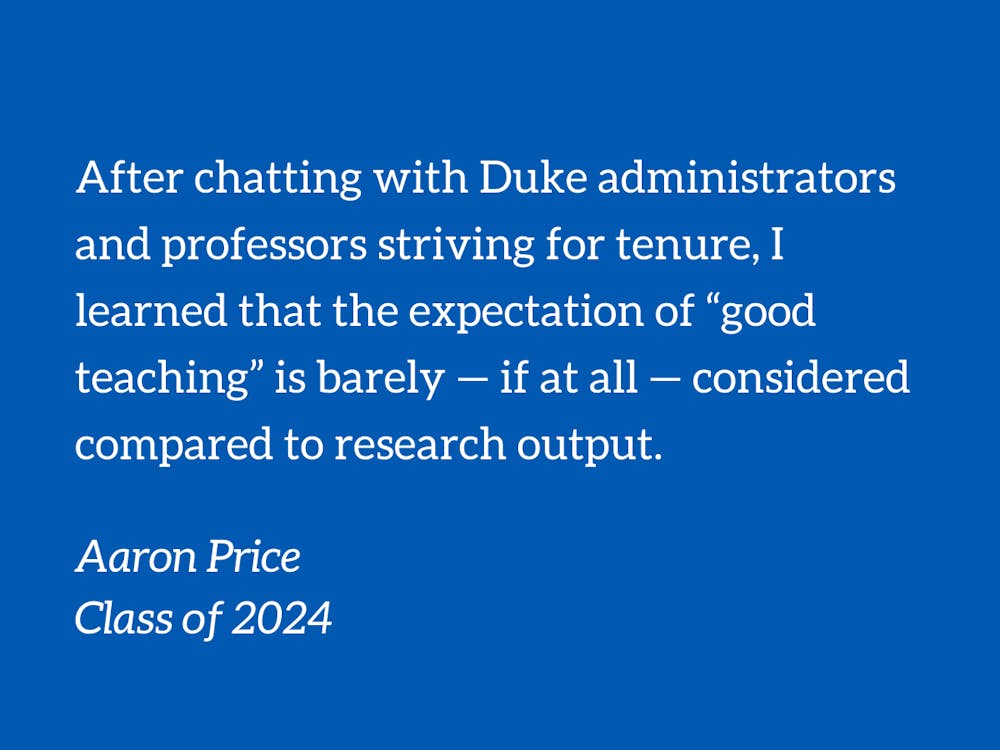As it happens with every computer science recitation section during class bookbagging, the focus of the meeting shifted from the assigned worksheet to course recommendations for the next semester. Eager underclassmen peppered the TAs and seniors with questions as they searched for courses that would be valuable for them — “valuable” being defined as either fascinating, pre-professionally helpful or easy.
One student started, “I’m really into artificial intelligence. What are your thoughts on those classes?”
The TA responded, “Outdated.”
Another sophomore jumped in, “What about this class? I’ve heard it’s helpful for internships?”
A senior butted in, “Good class but the professor is a jerk.”
This went on and on until I finally quipped in with the advice, “If you really want to prep for industry, don’t take any computer science classes and just work on your own side projects instead.”
Wow. Duke charges $60,000 a year for tuition and that’s the advice I gave to underclassmen? How did we get here and why isn’t undergraduate teaching being valued?
Here’s the thing: this is not the fault of the individual professors as much as a systemic issue with incentives in higher education, specifically with tenure.
Academic tenure is one of the most coveted promotions in academia. Originally conceived as a means to safeguard academic freedom, its true main perk is becoming almost unfireable. As such, for most professors, this job security is a highly attractive goal.
Tenure, according to the Duke Faculty Handbook, "should be reserved for those who have clearly demonstrated excellence in scholarship, and whose work has been widely perceived among their peers as outstanding.”
Ok. “Work” could mean teaching.
It continues: “Good teaching/mentoring and university/professional service should be expected but cannot in and of themselves be sufficient grounds for tenure. Sustained scholarly output is required for tenure.”
After chatting with Duke administrators and professors striving for tenure, I learned that the expectation of “good teaching” is barely — if at all — considered compared to research output. If professors earn promotions and recognition based on their research, their neglect for teaching starts to make sense.
One professor told me just a few days ago that she doesn’t meet with students to chat about her class or their academic goals. Why would she? Teaching doesn’t matter.
Or the computer science classes only teaching concepts from the 1980’s? Why update them? It doesn’t matter.
Now, I don’t think professors hate teaching or aren’t trying to serve their students. When I relay the “professor refusing to meet with me” story to other Duke educators, they give a sour face.
But, after chatting with a computer science professor about lecture creation, I began to understand the main reason for professor’s widespread prioritization of research over their undergraduate classes. He told me it’s common knowledge in academia that one hour of lecture takes eight hours to put together. So, he says, most professors write their curriculum once and never change it. Because if they did, over the course of a 15-week semester, a professor lecturing twice a week for an hour and 15 minutes would spend 300 hours building a new curriculum. That’s a lot of hours that could be spent on research instead.
And this is putting faculty in a tough spot. One professor in the humanities said he is thinking about leaving Duke because the administration keeps pushing him to publish but he wants to focus on teaching. He’s an incredibly loved professor by students but he needs tenure in order to feel like he can safely be there for his family. His focus on teaching is threatening his ability to support his children.
So here’s my idea: What if we gave professors a tenure-like perk for outstanding teaching? Incentives would be flipped for professors who love to teach and suddenly there would be a much higher emphasis on relevant and outstanding undergraduate classes.
Let’s recognize as a university and in the broader higher education sector that undergraduates should be deriving value from their classes. We are asked to pay $60,000 a year for it. At the very least, Duke should incentivize professors to care.
Get The Chronicle straight to your inbox
Sign up for our weekly newsletter. Cancel at any time.
Aaron Price is a Trinity senior. His column typically runs on alternate Tuesdays.

